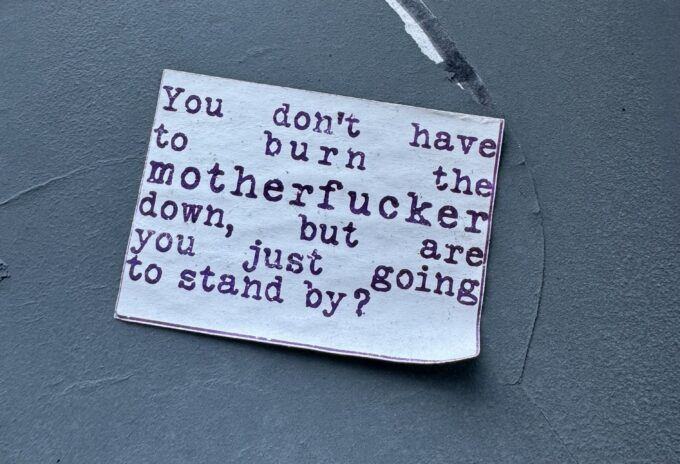
cruz
Published on http://www.counterpunch.org/
“The best conservatism balances support for free markets with a Judeo-Christian spirit of charity, compassion and solidarity. Cruz replaces this spirit with Spartan belligerence. He sows bitterness, influences his followers to lose all sense of proportion and teaches them to answer hate with hate.”
— David Brooks, “The Brutalism of Ted Cruz,” The New York Times, January 12, 2016
David Brooks observes a “pagan brutalism” in Ted Cruz and not the “compassionate conservatism” of George W. Bush, Mike Huckabee and Rick Santorum who “have in part emphasized the need to lend a helping hand to the economically stressed and the least fortunate among us.”
Cruz, in short, offends Brooks’ sense of “the best conservatism,” which, if one were referring to a “Court of the Conservatism That Is” and not a “Quixotic Court of Conservatism at Its Best.” amounts to an unbridled, Wild West kind of Market Rule played on a zero-sum game board where your winning means someone losing. And lest this rapacity be too brutal to win a Presidential election in a country that pitches its humanitarian values globally, a helping hand sowing Judeo-Christian beneficence must be evoked. “Cruz,” Brooks tells us, “is a stranger to most of what would generally be considered the Christian virtues: humility, mercy, compassion and grace.” One presumes then that in the Quixotic Court, i.e., this “best” conservatism that has never been, these virtues abound.
When we return to planet Earth, we see what Brooks sees and fears : that Trump’s twitter supporters tweet and don’t vote while Cruz’s backers expecting huge favors in return will vote. The “helping hand” spin is a sop to America’s “moral exceptionalism.”
In truth, that helping hand that is sowing virtues should not, by Market Rule decree, be enacted legislatively in any fashion lest “Moral Hazard!” set in and make “Moochers” of the “least fortunate among us.” Best policy then is to leave that sorry group to their own devices, encouraging them by such “tough love” to jump into the competitive arena and start a business, speculate in stocks and lotteries, and perhaps invent and market a new App. Thus, beneficence in any proactive manner must be evoked, not implemented. And this holds true in both Quixotic and Dark Courts of Conservatism, though the former wears the mask of “compassion” while the latter boldly makes a virtue of reversing a Judaic-Christian notion of moral action.
Rather than lend a helping hand to the least fortunate crowd, whose wages remain at a 1979 purchasing power level while the wealth of, say, those 158 families who have ponied up for about half the 2016 presidential election money thus far, has compounded exponentially, the “The Dark Court of Conservatism That Is” works strenuously to do nothing and allow “the invisible hand of the market” rule. This “Do Nothing governmentally” works to cut off all helping hand efforts, from vestiges of the New Deal to the already hobbled intent of the Affordable Care Act.
Historically, this approach of the “The Dark Court” is embarrassingly revealed, like the Wizard of Oz when the curtain is pulled back. Right now in Michigan, Governor Rick Snyder, accountant, never previously elected to office, but a man, like Dickens’s Merdle, with a reputation “for business,” is being compelled, bit by bit, to provide an account of how he did nothing while Flint citizens were hooked up to lead contaminated water. Years earlier, the “Do No Public Good” ethos of George W. Bush’s “Dark Court” was dramatically revealed when Hurricane Katrina struck New Orleans. In both Flint and New Orleans, it has been the poor, and mostly black in both cities, who were protected from the “Moral Hazard” that would ensue if anything were done to aid them. Far better, apparently, for the beleaguered to drown, starve or be poisoned than slide disastrously away from a “triumph of the will.”
“The Dark Court” wages a campaign of destruction, one that Brooks sees to his horror is being openly waged by Cruz. “Cruz’s programmatic agenda, to the extent that it exists in his speeches, is to destroy things: destroy the I.R.S., crush the `jackals’ of the E.P.A., end funding for Planned Parenthood, reverse Obama’s executive orders, make the desert glow in Syria, destroy the Iran nuclear accord.” However, none of this “brutality” would be opposed by those funding the present Republican presidential campaigns. Clearly, Trump and Cruz direct themselves more directly to those who are viscerally fired up, like Polyphemus, the Cyclops blinded by Odysseus, who swings in all directions. Those fired up want to be served raw meat without the assuaging trimmings Brooks’s Quixotic Court of Conservatism at its Best requires.
In this fevered climate of the “The Dark Court,” Americans, a number thus far sufficient to keep Trump on a roll and advance Cruz, have no need of and have little patience for a patina of “humility, compassion, mercy and grace” that Brooks’ “Quixotic Court” requires. The fact is that such sops to the “better angels of our nature” have always been a front, more reliably covered by Liberals, more accomplished Pecksniffians, thus enabling American politics to present a face to the world that appears not totally one of cutthroat capitalism and its progeny of inhumanity, greed, injustice and blindness.
Although Trump seems to be right at the heart of a new politics without genteel apologies or compassionate front, he is clearly ruled only by the vagaries of his own ego. He rules in the Dark Court of Egomania where economics is his, not Hakluyt’s. The triumph of the will is Trump’s will, not Ayn Rand’s. There’s no society in Trump’s politics. Cruz, on the other hand, may be just as great an apostate to any belief but in himself, but, like Iago, he inveigles himself in other identities in order to twist them to his own purposes.
For instance, he mocks the evangelical spirit itself by representing to them a fulfillment of that spirit through his platform of destruction. Thus, to be humble is to assert personal choice above societal or governmental rule; to be compassionate is to be the Samaritan who walks away; to be merciful is to see to it that the unfortunate reap fully the misfortune they have sowed. And grace is bestowed in the fulfillment of God’s rule, which is now synonymous with Market Rule.
There is no need then for Cruz to put a Christian veneer on the rapaciousness of “The Dark Court” because he has conflated the two. What Brooks sees as brutalism in platform, Cruz has converted into declarations of simple truths, beatitudes recognized in the “Dark Court of Conservatism That Is.”
Although we never discover what motivates Shakespeare’s Iago, it seems almost certain that our Cruz wants to take the Republican Party to the extreme economic laissez-faire that financialized capitalism always claims it has been denied. Cruz is almost certain to be rewarded for this by virtue of that revolving door arrangement between the government and the private sector that has done so much to advance plutarchy. Thus, Cruz’s commitment to free market play cut loose from any governmental oversight parallels the declarations of the Club for Growth: cutting taxes, controlling federal spending, personal accounts for Social Security, ending the death tax, eliminating the capital gains tax, fundamental tax reform, providing true school choice and minimizing government’s role in our daily lives.
Cruz makes the Dark Court so much darker in regard to tax reform. The tax reform that Cruz proposes is a flat tax and an elimination of the IRS, the agency that is presently investigating The Renaissance Group, a hedge fund that has contributed eleven million dollars to Cruz’s campaign. Cruz’s flat tax proposal promises to relieve every citizen of the bureaucratic nightmare of doing taxes while at the same time destroying the progressive income tax system which had been, as instituted by FDR, a strong contributor to the growth of the middle class, as was estate tax (“death” tax), and a strong capital gains tax. What Cruz promises the wealthy is relief from the cost of paying their tax people for challenging the efforts of the IRS to tax them. There will be virtually no taxes on them to challenge.
Cruz also makes the Dark Court so much darker in regard to education. Public schools do not need marketplace competition, but because “choice” is always a good in the American mass psyche, charter schools now seem to confirm some deep sense of freedom. What “choice” represents here, however, is not existential freedom but a chance for Wall Street backers of “charter” schools to “monetize” their new holdings.
What was once public education would fall as other previously public entities have to the monetizing urge of The Dark Court.” Statistics now show us that our ill-conceived adventures in Iraq and Afghanistan were so monetized. Cruz wants a war as enthusiastically as a corporation wants a new marketing frontier: “[W]e will utterly destroy ISIS. We will carpet bomb them into oblivion. I don’t know if sand can glow in the dark, but we’re going to find out.”
Even more pernicious in its effects than privatizing both education and war is the way electoral campaigns have been privatized. Future profit making depends upon expenditures supporting candidates who will lead in the continued privatization of all things public, as well as the elimination of all things public which cannot be monetized, or which in fact are dangers to the rule of profit. Obama’s Affordable Care Act needs to be “overturned” because it represents a first feeble step to cut into those profits. The slippery slope here leads possibly to socialized medicine, something the health care industry puts as much money into preventing as plutocrats put into controlling elections.
The goal to monetize everything, to go into every niche and corner of human life and explore their monetizing possibilities , which is the ruling passion and guiding principle of The Dark Court, has absolutely no link to the “better angels of our nature” David Brooks finds wanting in Ted Cruz. They are absent in “The Dark Court of the Conservatism That Is” and only paid lip service in “The Quixotic Court of Conservatism At Its Best” because the feeling in this court is that Americans want the “war of all against all” that their economic system plays sugar coated. Americans, in this view, are not ready for the raw opportunism of Cruz or the raw egoism of Trump. Both Trump and Cruz, however, having been operating very effectively in the “Dark Court.” One can presume that a good number of Americans are to be found there also.
“The Quixotic Court of Conservatism At Its Best” cannot attack either Cruz or Trump on any grounds but what they share with Liberals, that is, the high ground of humanitarian compassion and moral principle. They are in this bind because the premises of the Dark Court are the same premises as the Quixotic Court and because the former represents a logical extension of Market Rule premises while the latter cannot accommodate those premises and their ideals. The Quixotic Court’s critique of the Dark Court can only head toward some control of Market Rule, some undermining of uninhibited growth, some support of equitable redistribution, some disclosure of the stochastic nature of winning and losing.
None of this can be done in any conservative court. To inch toward any of this would be to join Bernie Sanders who is already seeking a restructuring of Market Rule.
And so Cruz is “brutal” but nonetheless a perfect logical extension, a fitting culmination, the politician Market Rule has been at work creating since Reagan. He is a dark entity of the Dark Court of Conservatism. And Trump, to repeat, is self created, and thus in no manner the culmination of anything outside himself. Regardless of his self-deification, he as much as Cruz is a product of a schizoid conservatism in which it now seems a crude reality is eliminating its prior pretenses.














